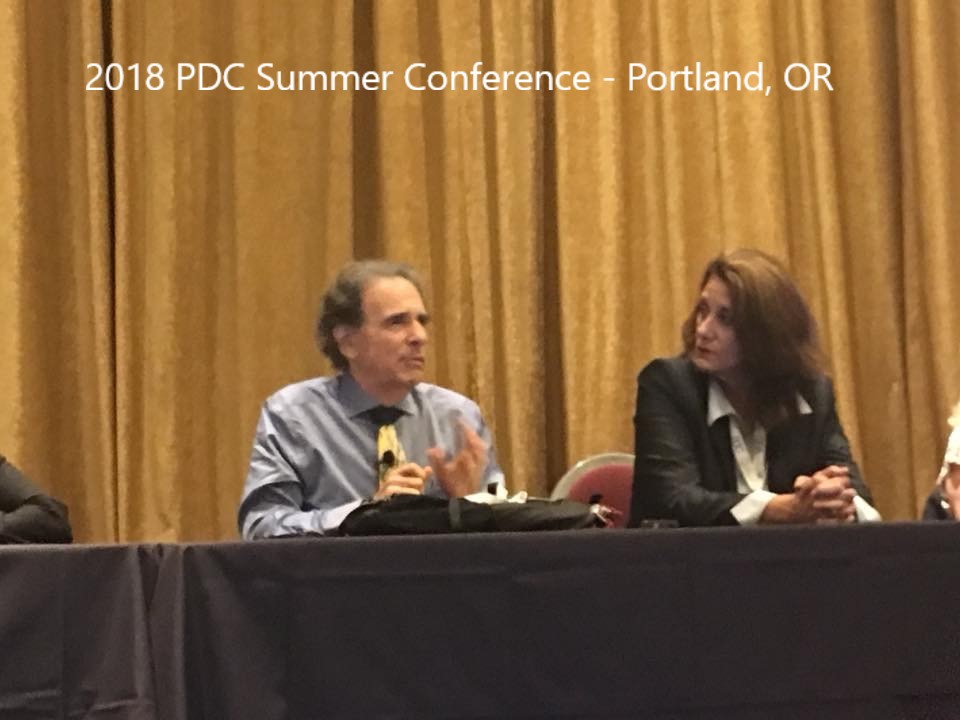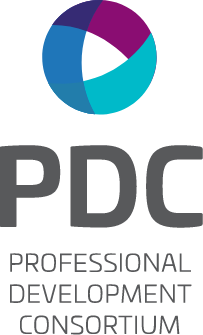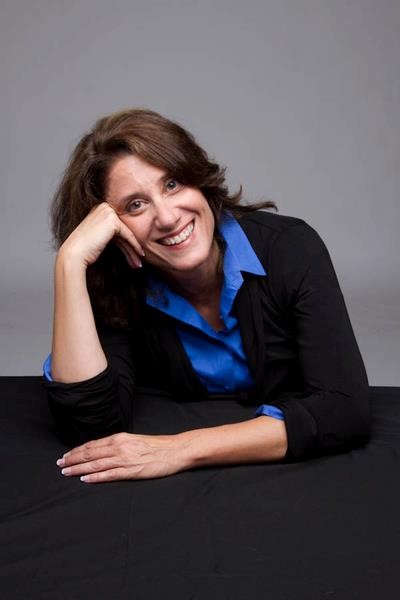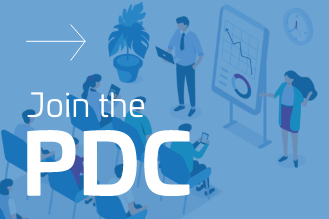You are here
Why I Joined the PDC
October 16, 2018
Susan Parker Schmitz
Senior Consultant - Infrastructure Delivery
Dell EMC
WHY I JOINED THE PDC
It was a typically muggy March Sunday in 2017 when I first learned about the Professional Development Consortium (PDC) on the patio of a casual Houston restaurant. Gray picnic tables, waitresses in shorts and sandals, loud chatter, laughter—and some tears, as toddlers fought over plastic toys in a play area designed to entice young parents to forego their babysitters. A friend and former colleague, Tim Regan, with whom I had once worked at a legal recruiting firm, asked me to join his family for an early, kid-friendly dinner. Joining Tim, and his wife, Allison, and three-year-old daughter, Evelyn, were Amy Hancock, her husband, and her daughter, Amelia—another three-year-old who also happens to be Evelyn’s best friend.
As we chatted about the humidity, kids, and how we all knew each other, Amy asked me what I did for a living. I explained that after a career in sales and then recruiting executives and lawyers in Houston, I’d joined a D&I consultancy as business development director before moving to Austin to join Dell. My career at Dell began in Learning & Development, until my efforts focused on culture and professional development for a global, 1,400-person business unit.
We talked a bit about the overlap of some of our efforts at work. Allison, at the time, was at the University of Houston’s Law School, and Amy was with Andrews Kurth. Then Allison told me about the PDC, where she was serving on the conference planning committee for the 2017 summer conference in Austin. Amy explained she was nearing the end of her term as PDC chair and that the organization was looking to add Alliance members—those who were in professional development at corporations and not necessarily focused on lawyers.
Over the course of the meal, between playing with the girls and taking pictures in the play area, Amy and Allison helped me learn about the PDC’s mission to bring PD professionals together to share best practices and experiences. It was a fun conversation, and I was intrigued. Later that week, Amy and I spoke again and she asked me whether, after joining the PDC, I would participate in a panel discussion at the upcoming conference. I happily agreed.
RESULTS OF JOINING THE PDC
That spring was particularly busy—I combined overseas business travel with a trip to see my daughter in Seoul. While in Seoul, Tracey LaLonde, the moderator for our conference session, scheduled meetings with Scott Westfahl, the director of Harvard Law School’s Executive Education, and me to plan for the session. I could tell from our phone calls that I was joining an impressive team, with each of us adding valuable perspectives—Tracey leading the discussion and identifying the bridges between Scott’s experiences and mine.
In July, I returned home to Austin and attended my first PDC conference. My day began with the New Member session. I felt a bit awkward, but my nerves were calmed by the fact that everyone was so welcoming and friendly. Allison introduced me to Cindy Lindsley, the conference chair, and other members of the committee, including Jen Pangione from Skadden Arps, who has since become a respected colleague and dear friend.
Scott was amazing during our plenary session, and Tracey was adept at connecting the dots between our conversations. The audience seemed particularly engaged and energized as we discussed challenges and innovations, pitfalls and new learnings.
Over the course of the conference, I learned new ways to promote the adoption of ideas, enhance my writing skills, and leverage design thinking. I also met the 2018 PDC chair, Don Smith of Fried Frank, and a previous chair, Bert Lipshie from Stroock & Stroock. At one of the evening functions (which was super-fun, by the way), Johnna Story of Finnegan asked me if I would be interested in contributing an article for the PDC newsletter. At dinner, Clarice Wahba from Stroock & Stroock suggested I speak with Dr. Larry Richard about my idea to combine technology with psychology and brain science to garner even better results.
I found every aspect of the conference to be jam-packed with positivity. Whether having fun at Austin’s Esther’s Follies, chatting at the bar over a glass of wine, or listening to world-class speakers, every single person with whom I spoke was helpful, kind and interesting. Even more impressive? I’d found a wider family of people who, like me, were passionate about their profession. They were committed to best practices—both learning and sharing them. In fact, it was stunning to experience their humility and generosity.
In between sessions, many of us talked about the importance of feedback and how there never seemed to be enough of it in our organizations. Many of those discussions inspired me to find a way that technology could help support additional feedback and human interaction to drive the right learning and behaviors.
After the conference, I attended a Texas regional meeting in Dallas at the offices of Baker Botts and shared a few more laughs with Jessica Hoffman and others. The following day, I had lunch with Jennifer Queen at Bracewell. They were now my colleagues, and I felt good about the enhancement to my learning as well as the sense of community and FUN.
In the fall, I had lunch with Don Smith in Washington, D.C., and we spoke about augmented and virtual reality and their impact on learning. I also shared lunch and stories (in both Spanish and English) with Andy Colón, Thompson Hine’s chief talent officer. Both of them inspired me further, and I have since led a session on women’s leadership at Andy’s firm in my home state of Ohio.
I also took Clarice Wahba’s advice and called Dr. Larry Richard. We met in New York for lunch, and he shared his amazing wealth of knowledge and perspective on the importance of feedback—especially with Millennials and the impact on retention and organizational culture.
I attended the PDC Winter Meeting in Washington, D.C., where I connected with Andy, Don and many others I’d met in Austin. I heard incredible speakers like Terri Mottershead, whose message resonated with the work and speaking I’ve been doing around the Future of Work. What’s more, I met Yakiry Adal of Stroock & Stroock. Together, after another few meetings in New York, we decided to collaborate on a diversity initiative we’re naming “Avenues to Empathy.”
Late in the year, I collaborated with some tech friends, including Bill Berger, a Solution Architect and former colleague, to collaboratively create a feedback app based in great part on the insights I’d received from those within the PDC.
During this year’s PDC summer conference in Portland, I presented on “Making the Most of Feedback” with an esteemed panel of Amy Hancock of Hunton Andrews Kurth, Jen Pangione of Skadden Arps, and Dr. Larry Richard of LawyerBrain! During the session, I was able to tell conference attendees a little about the feedback app I’ve been working on.
I’ve been so inspired by the openness and generosity of PDC members. It’s allowed me to integrate the knowledge I’ve gained from my involvement with the PDC over the past year with my current practices.
In the audience and at social events, I was also joined by another colleague, Sherryl Hauglum, an award-winning coach and teacher. Together, with Bill, Tim and Larry’s insights, we’re forming a new organization named AttorneyPD. We hope to leverage a multi-disciplinary approach—synthesizing principles from psychology, law, business, technology and education to produce unbelievable gains in productivity, performance and client satisfaction.
How about that for a first-year experience?
WHY YOU SHOULD JOIN
If you’re looking for an organization that provides an opportunity for you to share what you know, validate what you think, and bring new insights to your strategic initiatives and day-to-day work, and if you like smart yet humble, incredibly competent individuals who share your passion for people, learning, and professional development, I urge you to consider joining the PDC. You don’t have to be a lawyer. You don’t even have to work with lawyers. What you do need is a passion for professional development and a willingness to share and listen, as well as a desire to collaborate with people who take their careers (but not themselves) very seriously.





